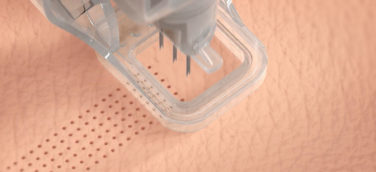Med Device Department: New Bioelectronic Devices Grew Electrodes in Zebrafish
Bioelectronic devices, such as pacemakers and metabolic monitors, have been based off of models we find in biology for years. Research teams at Linköping, Lund, and Gothenburg universities in Sweden are changing the model. “Now we let biology create the electronics for us,” says Professor Magnus Berggren at the Laboratory for Organic Electronics (LOE) at Linköping University.
The electronics we are used to seeing are built off of a traditional semi-conductor model that is nearly impossible to combine with living biological electrical signal systems. The researchers are remedying this by developing a soft, substrate-free, electronically conductive gel that contains enzymes that can be thought of as the “assembly molecules.” When this gel was injected into the living tissue of zebrafish and leeches, electrodes grew among the gel.
“Contact with the body’s substances changes the structure of the gel and makes it electrically conductive, which it isn’t before injection,” states author and researcher at LOE and Lund University, Xenofon Strakosas. “Depending on the tissue, we can also adjust the composition of the gel to get the electrical process going.”
The biological endogenous molecules are all that was needed to build these electrodes whereas any bioelectrical research in the past has utilized external electrical or light energy. This revolutionizes bioelectric medical devices in that it can eliminate the need to implant a device to start electric impulses in the body, and replace this with a simple viscous gel. The researchers were even able to target specific biological structures, successfully forming an interface for nerve stimulation in the fish with the gel and achieved electrode formation in the brain, heart, and tail fins of zebrafish.
“Our results open up for completely new ways of thinking about biology and electronics,” states Hanne Biesmans, author and PhD student at LOE. “We still have a range of problems to solve, but this study is a good starting point for future research.”
Doctor Docs: Physicians Ready For mRNA Treatments but Hesitant About Biosimilars
Sermo, a physician online community, conducted a study of over 1,200 global physicians as the latest J.P. Morgan Healthcare Conference was held, gauging their reactions to the latest trends in healthcare and therapeutics. First, the study showed overwhelming acceptance of mRNA technology, with physicians of all 14 specialties agreeing that it will play a role in medical care well beyond the COVID-19 pandemic. About 77% of physicians reported they would prescribe mRNA technology treatments once available, and excitement is especially high for the future of mRNA in oncology. But while physicians are ready to utilize what the new technology will have to offer, 61% are concerned that patients will be hard to convince due to the misinformation surrounding mRNA vaccines during the pandemic.
While excitement seemed unanimous for mRNA tech, biosimilars were found to produce a much more uneasy response from physicians following extensive discussions at the J.P. Morgan Healthcare Conference. When it comes to prescribing biosimilars versus branded drugs, 48% of surveyed physicians cite comparable efficacy data as the key influencer of their choice, while only 19% cite the financial factor as most important. Amid a rush for companies to get biosimilars for Humira on the market, (Amgen’s Amjevita biosimilar is already available as a lower cost alternative to patients), physician preferences are going to become extremely important for the success of these biosimilars.
The U.S. currently requires biosimilar drugs to prove through a “switching study” to have comparable efficacy and safety to a reference product to be classified as “interchangeable.” This status allows pharmacists to swap biosimilars for the original medicine without asking for physician approval. Among those surveyed, 48% of doctors aren’t sure if the FDA should do away with switching studies and make all biosimilars interchangeable, while 77% reported that they preferred their patients receive exactly what they prescribed.
Therapeutic Talk: mRNA Could Have Applications for Preeclampsia

One of the many discussions prompted by the recent abortion controversies surrounds the untalked about pregnancy risks that abound, disproportionately for many minority communities, in America. One such condition is preeclampsia, a common and dangerous condition where malformed blood vessels to the placenta prevent proper blood flow between the mother and the fetus, causing health risks for both.
Researchers from the University of Pennsylvania have published a paper that describes how they developed and used lipid nanoparticles, or LPNs, to deliver mRNA directly to the placenta and tell genes to express a blood-vessel expanding protein in mice. The process has proved successful in the test animals, and lead author Kelsey Swingle, a PhD student at UPenn, told Fierce Biotech Research, “As we continue to work towards translating these LNPs from bench top to animal models to perhaps patients one day, this therapy has the potential to benefit both maternal and fetal health.”
While the exact causes of preeclampsia are still not understood, the key to resolving the condition is reinstating normal blood flow to the placenta by dilating the blood vessels, which is currently done by either overexpressing the protein vascular endothelial factor (VEGF) or down-regulating its receptor sFlt-1. Using LNPs, Swingle and the research team are the first to deliver mRNA directly to the placenta, which so far shows to increase the success of treatment notably.
FDA Update
Drug Approvals
The FDA has approved the first and only indication for the treatment of Friedreich ataxia. Skyclarys (omaveloxolone) by Reata Pharmaceuticals can be used in adults and adolescents aged 16 years and older. Friedreich’s ataxia is an ultra-rare, inherited neurodegenerative disorder that is typically diagnosed during adolescence. Symptoms include the loss of coordination, muscle weakness, and fatigue, which commonly progresses to incapacitation by the teen years and eventually death.
The FDA has approved Prevduo for indication in patients age two years and older to reverse the effects of non-depolarizing neuromuscular blocking agents (NMBAs) after surgery. The Slayback Pharma drug is designed to also decrease the peripheral muscarinic effects associated with cholinesterase inhibition following NMBA reversal administration.
Lamzede (velmanase alfa) from Chiesi Global Rare Diseases is the first enzyme replacement therapy approved in the U.S. for the treatment of the non-central nervous system manifestations of alpha-mannosidosis, a rare genetic condition characterized by the lack of the alpha-mannosidase enzyme in the body.
Med Device Approvals
The FDA has expanded clearance of the wearable cuff from Theranica that eases the symptoms of migraines. The new indication allows the prescription-only Nerivio neuromodulation armband to be used for preventing headaches from coming on rather than simply treating them after onset. The device’s preventive use was cleared for people who experience migraines with or without aura and who are at least 12 years old. During use, the armband is controlled by a smartphone app and uses built-in electrodes to send specific pain signals to peripheral nerves that trigger internal pain management signals. The approach is accepted as a valid acute treatment for migraine, and new studies show that the stimulated pain relief across the nervous system can stop the migraine onset with 45-minute treatments administered every other day.






